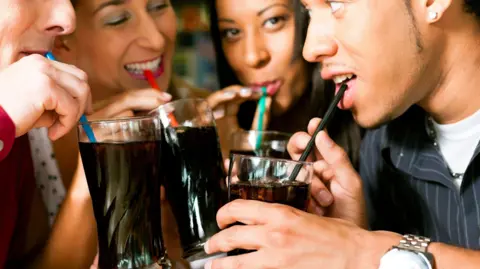Jordan Hayes typically steers clear of politics. He did not vote in the 2024 election and has mixed feelings about Donald Trump.So the 37-year-old from California was surprised to learn last week that he stands with the president on at least one issue – Coke made with cane sugar is better.”There’s a different kind of sweetness involved,” said Hayes, a longtime fan of cane sugar Coke, which is marketed in the US as Mexican Coke and differs from the corn syrup version typically sold there.It’s available to Americans at a premium but Hayes contends the higher price is worth it. The president made a similar case last week, when he announced that Coca-Cola, at his urging, had agreed to use cane sugar in the US.The sugar endorsement by Trump might seem unusual on its face from a man famous for his preference for Diet Coke, which is sugar free.But it was just the latest example of his support for the industry, which has been known in Washington for decades for its outsize political donations, ability to get the White House on the phone and legendary lobbying operations.”Don’t [expletive] with sugar”, former Republican House Speaker John Boehner noted in his memoir.
The sector has long benefited from government policies, including high tariffs that have propped up the sugar prices in the US, which often run double the world price, yielding billions of extra dollars a year for producers.Under the Trump administration, the US has expanded those supports, tightening restrictions on imports and increasing its price guarantees for sugar farmers as part of the Trump-backed “Big Beautiful Bill”.Meanwhile, Trump’s Health Secretary Robert F Kennedy Jr has taken aim at the industry’s biggest competitor, threatening a ban on corn syrup, which he has called “poison”.The Sugar Alliance, which represents the sector, did not respond to requests for comment on Coca-Cola’s decision, for which Trump took credit.But analysts said the move put sugar farmers in a sweet spot, increasing demand and ultimately how much they get for their crop.”They have the president both championing restrictions that keep out foreign competition and also encouraging more use of sugar,” said Colin Grabow, a trade specialist at the Cato Institute. “This is fantastic for them.”
Industry experts said Coca-Cola’s plan was unlikely to lead to a sudden, wholesale shift to sugar, noting the high price of the ingredient and limits on domestic supply. But just the possibility sent waves through the food industry.Corn syrup manufacturer Archer Daniels Midland briefly plunged more than 6% before recovering, while the Corn Refiners Association, which represents makers of corn syrup, warned of rural job losses and other economic damage.Iowa corn farmer John Maxwell, whose family has farmed since the 1850s, said he was surprised by the president’s position, given the way he has cast himself as a champion of American jobs.”He’s tooted that horn real hard… so to take a stance was surprising to me,” he said.Bob Hemesath, a hog and corn farmer in Iowa, was likewise puzzled.”Going away from high fructose corn syrup will hurt jobs here and hurt farmers here and it kind of goes against everything the president and his administration are trying to do,” he said.
Vincent Smith, director of agricultural policy studies at the American Enterprise Institute, said he was surprised to see Trump risk support from corn growers – a key part of his base and also traditionally powerful in Washington.It is also a far bigger group than sugar farmers, who number only about 4,000 in the US, less than a quarter of which produce sugar cane.”Do you want to alienate 200,000 people or do you want to alienate 4,000 families?” he asked, while noting that his review of political contributions between 2018 and 2022 found members of the Sugar Alliance gave more than any other agricultural interest group, despite being small in number.Trump-backed groups are among the ones in recent years to have received significant donations from the Fanjul family, Florida-based sugar titans, according to OpenSecrets.”If you can write large cheques for the election or the president, you do get access,” Smith said.In January, when Coca-Cola presented Trump with personalised cans of diet cola, Trump raised sugar use with the company, getting Jose Fanjul on the phone to discuss the issue, according to Josh Dawsey’s new book 2024: How Trump Retook the White House.Whether Americans will go for it remains an open question.Mexican Coke, which Coca-Cola has offered in the US for two decades, has gained a devoted following from customers like Hayes.But the company’s decision to start selling it had more to do with tapping into an immigrant market and nostalgia for glass bottles than health or flavour benefits.In recent years its primary focus has been expanding low and no sugar options, as concerns about sugar and the rise of anti-obesity drugs threaten its grip on the beverage market.
健康专家称尚无确凿证据支持偏爱某一种甜味剂
加州大学戴维斯分校研究员兼营养生物学家金伯·斯坦霍普表示:”两种糖分都会增加所有风险因素,且二者之间不存在显著差异。”她曾进行过为期两周的对比实验,研究蔗糖与玉米糖浆的摄入影响。斯坦霍普指出,关于汽水中玉米糖浆具体成分仍存疑问,这可能导致实验室外的健康差异。但她驳斥了”普通蔗糖加工程度更低”的说法,称这种观点”纯属狡辩”,并强调两种产品都需要去除纤维和其他营养成分。
关于蔗糖可乐是否真的口感更佳的争论可能仍将持续发酵。现年48岁的田纳西州居民理查德·特拉帕斯每天饮用一两罐可乐,并收藏可口可乐纪念品,包括装饰品和复古玻璃瓶。他自豪地宣称能通过气泡数量区分可口可乐与百事可乐。几年前听闻墨西哥可乐的宣传后,他让妻子协助进行了一次双盲口味测试。”我第一反应是’你是不是用同种汽水耍我'”,他回忆道,”随后发现’它们尝起来完全一样'”。
尽管本人持中立态度,特拉帕斯认为特朗普支持蔗糖的立场会吸引两类人群:对玉米糖浆持怀疑态度者,以及怀念老版可口可乐的怀旧群体。”我们要在经典可口可乐产品中恢复蔗糖配方——这很对他的粉丝胃口”,他评价道。
【本文精选自BBC,原文链接:https://www.bbc.com/news/articles/cp8263jn20zo】

